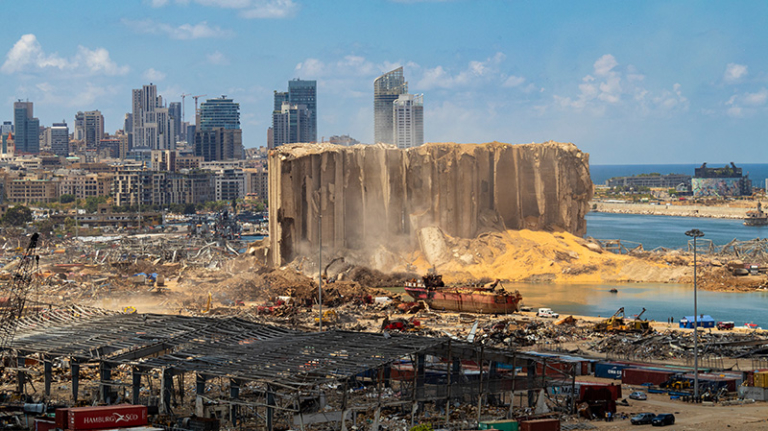
Nearly five years after the devastating explosion at the Port of Beirut that killed some 220 people, injured some 7,000, and left a large portion of the city in ruins, Lebanon’s long-stalled judicial investigation into the blast has shown signs of revival. The lead investigator, Judge Tarek Bitar, has unexpectedly resumed proceedings, summoning several people for questioning in a renewed attempt to deliver justice to a nation long plagued by impunity. He is reported to be ready to issue his indictment next August which would be the fifth anniversary of the blast. Such rare acts may galvanize the country’s paralyzed judicial system.
The August 4, 2020, blast, caused by the detonation of hundreds of tons of poorly stored ammonium nitrate, was one of the biggest non-nuclear explosions in history. It decimated the port area, damaged half the city, and sent shockwaves beyond Lebanon’s borders. Despite the scale of the catastrophe, efforts to investigate and prosecute those responsible have faced repeated obstruction, primarily from Lebanon’s powerful political class.
The case’s resumption, made possible in part by President Joseph Aoun’s election and the formation of Prime Minister Nawaf Salam’s reformist government, potentially marks a defining moment for accountability—not just for the negligence that caused the blast, but also for the systemic corruption that enabled it. Smuggling and disorder was rampant at the port facility. The whole political class, including Hezbollah which controlled the port and used it for its own purposes, is implicated in such corruption.
The case’s resumption is made possible in part by Aoun’s election and Nawaf Salam’s reformist government.
Because the blast was an example of Lebanon’s dysfunctions—among them state capture by a mafia-militia and endemic corruption made worse by a weakened and compromised judiciary— pursuing the case may not only lead to justice for the victims but also may bring broader accountability to a negligent political class that has been beholden to Hezbollah. It will also be a test case for the judiciary’s ability to prove, despite years of disregard and attrition, that it retains a solid core that can be used to rebuild trust in Lebanese institutions.
In tandem, the government has taken some promising steps to revitalize the judiciary, including the government’s approval of a draft law on judicial independence to strengthen judicial autonomy and transparency. Although the law is still under parliamentary review, such efforts bode well for judicial reform, especially if they are accompanied by additional serious efforts to strengthen the country’s legal system.
The Beirut Blast Case
At the center of the case is Judge Tarek Bitar, who took it over in February 2021 after his predecessor, Judge Fadi Sawan, was removed due to political pressure. Judge Bitar attempted to hold high-ranking officials accountable based on extensive documentation indicating that numerous political, military, and administrative figures had been aware of the dangerous chemicals at the port for years. His efforts were quickly met with fierce resistance, including lawsuits filed by politicians, parliamentary immunity claims, and, in late 2021, a complete judicial freeze. The investigation was at a standstill for nearly two years.
Public outrage grew as victims’ families and civil society organizations demanded transparency and justice. They staged protests and sit-ins, made international appeals, and called for an independent international investigation in light of the Lebanese judiciary’s failure to operate free of political interference.
Prime Minister Salam has vowed to prioritize justice for port blast victims. Only two days after Salam was appointed in January 2025, Bitar quietly resumed his work. Though details remain guarded, reports confirm that he has filed new charges against several individuals, including senior security officials with presumed connections to Iran-backed Hezbollah. Charges also target previously named suspects, such as former interior minister Nohad Machnouk, who was questioned on April 25, former prime minister Hassan Diab, who is scheduled to appear in May, and other political leaders, including judges involved in the case.
Lebanon’s Judiciary
Lebanon’s judicial system has long been tainted by institutionalized impunity and political interference. Appointments to key judicial posts are heavily influenced by the sectarian patronage-based system, leaving judges vulnerable to political pressure that often translates into obstruction of justice and stalled criminal investigations.
Indeed, the obstruction of the port blast investigation became emblematic of these systemic flaws, and the inquiry is a high-profile litmus test for the credibility of Lebanon’s legal institutions. From its inception, investigation judges were successively removed, implicated ministers were shielded through immunity, due process violations were committed, and deleterious actions were taken by the public prosecutor, who controversially released all detainees in the case. The investigation was especially bogged down after Hezbollah Secretary General Hassan Nasrallah, in a deliberate attempt to disrupt the probe, accused Bitar of political bias and called for him to be replaced. The failure of justice in the port disaster is part of a broader culture of impunity that has prevailed since the Lebanese civil war, which ended in 1990 with an amnesty law that pardoned perpetrators, many of whom went on to become Lebanon’s post-war leaders. The amnesty also restricted prosecutable crimes in the process, thwarting prospects for restitution, accountability, and justice.
Demands for reform and accountability have persisted, especially in the aftermath of Lebanon’s 2019 economic collapse.
But demands for reform and accountability have persisted, especially in the aftermath of Lebanon’s 2019 economic collapse, deemed a deliberate depression orchestrated by the country’s leadership. Such demands have included calls to hold corrupt officials accountable and freeze their assets abroad, and have met some success, including in a French court’s freezing of more than $130 million in assets of the embattled ex-central bank governor Riad Salameh over alleged financial crimes.
Despite significant risks to his safety and career, Judge Bitar’s decision to resume the investigation with 10 new indictments has been hailed as an act of integrity and strength. Supporters describe him as a symbol of resistance (a “white knight,” “incorruptible”) to Lebanon’s entrenched culture of impunity. The renewed probe also comes at a time when Hezbollah is severely hampered following the devastating war with Israel, which helped enable the election of President Aoun and the formation of the new independent government that has pledged to reform the judiciary. Bitar’s critics, many of whom are current or former government officials rattled by his supposed audacity, continue to accuse him of politicizing the investigation.
What the High Stakes for Victims Bodes for the Country
The stakes could not be higher. For the families of the victims who have been asking for truth and justice through a genuinely impartial and independent investigation into the disaster, this case represents the only path toward accountability. It could also be regenerating for the country, signaling a new path toward truth and a rights-based culture.
Within Lebanon, public faith in the judiciary is at an all-time low. Not only are Lebanese judges disillusioned, but the public’s trust in the judiciary is sapped. Years of political paralysis, corruption scandals, and economic collapse have left the population cynical. The port blast inquiry offers a rare chance to rebuild this trust—but only if it results in concrete action.
International observers are watching closely. In 2023, several countries, including France and Germany, opened investigations into the deaths of their citizens in the blast. Global nongovernmental organizations including Forensic Architecture, Legal Action Worldwide, and the Organized Crime and Corruption Reporting Project did the same. Thirty-eight countries on the United Nations Human Rights Council (UNHRC) as well as the European Union have repeatedly expressed concern over Lebanon’s failure to conduct a credible investigation, with some critics even suggesting targeted sanctions against those obstructing justice.
On the domestic front, the Lebanese Bar Association and local civil society groups have long advocated for legal reforms to bring about judicial independence. They have been advocating for the need to restore judicial functionality and to expedite key cases like the Beirut blast investigation, which is not just about accountability for a single incident but, arguably, for the soul of the Lebanese state.
The struggle against impunity is especially relevant on the 50th anniversary of the start of Lebanon’s 15-year civil war, a past with which the country has not entirely come to terms. Lebanon remains mired in civil conflict, its society profoundly divided, and its state hijacked by warlords and oligarchs, a situation that has ensured the prevalence and persistence of impunity. And the Beirut blast investigation is not the only instance of the failure of justice. So are the series of high-profile assassinations of journalists, intellectuals, and politicians that shook Lebanon in the aftermath of the civil war. The country’s corrupt warlords became part of the class of kleptocrats and oligarchs who represent Lebanon’s political leadership. The country will remain divided, and the state captured until Lebanon confronts this truth and holds its leaders accountable.
Bitar’s progress may be halted again if political actors resort to familiar tactics to derail the case.
Much of this is rooted in the amnesty law that accompanied the end of the civil war. As part of disarming factions and establishing peace, the law retroactively absolved protagonists of responsibility for crimes committed during the war, effectively shielding leaders from persecution. The absence of accountability, which allowed warlords to refashion themselves into political leaders, not only helped cement the prior system of governance but also, in the absence of an “official story,” created a war of separate communal understandings of the war and eventually entrenched a culture of immunity.
Experts warn that Bitar’s progress may be halted again if political actors resort to familiar tactics to derail the case—legal roadblocks, administrative reshuffles, or even direct threats. Amidst renewed efforts to discredit and remove him, legal scholars and human rights advocates are calling for robust international oversight and international pressure to safeguard the process, with a focus on the international community’s role. Some victims’ families have petitioned international bodies such as the UNHRC and the International Criminal Court asking for the establishment of an “international, independent and impartial fact-finding mission into human rights violations” and arguing that crimes against humanity may have occurred. While legal jurisdiction remains a complex issue, these efforts underscore the global dimensions of the blast and its aftermath.
A Sense of Possibility
Meanwhile, Beirut remains scarred. Entire neighborhoods near the port still bear that day’s physical and emotional wounds. Memorials dot the city, and murals of the victims serve as a reminder of what was lost. For many, the absence of justice has only deepened the internalized traumas of the Lebanese, signaling that the country’s rescue and recovery cannot happen absent an accountability agenda.
But amidst the despair, there is a cautious sense of possibility, especially with Lebanon’s changing political dynamics and Hezbollah’s weakening. If Judge Bitar is allowed to proceed without interference, if charges lead to arrests, and if trials are held in open court, this could mark the beginning of a new chapter—not just in the port blast case but in Lebanon’s broader struggle for accountability and for an end to Hezbollah’s capture of the state. This would, however, need to be complemented with efforts to bolster the rule of law, promote judicial independence, and examine the past. The current government’s most recent efforts to enshrine judicial independence are steps in this direction.
There is still a long road ahead. Political interference is a real and present danger, and the judiciary still needs deep structural reform. But there is a flicker of hope for the first time in years. For the Lebanese people, this may be enough to keep the fight for justice alive, confront the country’s checkered past, and overcome an entrenched system of impunity.
The views expressed in this publication are the author’s own and do not necessarily reflect the position of Arab Center Washington DC, its staff, or its Board of Directors.
Featured image credit: Shutterstock/Ali Chehade

